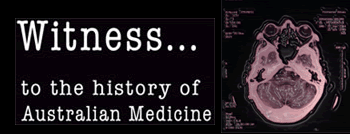


Tobacco Control: Australia's Role
Transcript of Witness Seminar
Introduction
Building the case for tobacco control
Producing, and Responding to, the Evidence
Campaigning for Tobacco Control
Economic Initiatives in Tobacco Control
The Radical Wing of Tobacco Control
Revolutionary Road
Tobacco Industry Strategies and Responses to Them
Campaign Evaluation
Managing Difficulties in Light of Community Consensus
Radical Wing Again
The Process of Political Change
Tobacco Campaigns Up Close
A Speedier Pace of Change
Political Needs and Campaign Strategies
Litigation and its Impacts
Insights from Tobacco Control
Tobacco Control in Australia in International Perspective
Appendix 1: Statement by Anne Jones
Endnotes
Index
Search
Help
Contact us

Ann Westmore: Thanks very much, Lyn.
Iíd like to start with an overview of Witness seminars so that you know a little about them and why they are important.
If you think about the experience of living as a human being, biologically speaking, itís clear that medicine and science, often backed by political action and public education, have transformed that experience, most profoundly since the 1920s. Much of the work that has underpinned this transformation is still within living memory.
Australian researchers and clinicians, public health activists and politicians have played an outstanding part in the associated knowledge explosion, far out of proportion to the size of our nationís population and in spite of its geographic remoteness from centres of learning with which we usually compare ourselves.
So much has happened in Australia. Yet too little of it has been recorded and evaluated. An intellectually rigorous and well-informed oral record is vital for current and future generations.
This Witness seminar is based on a tradition going back several decades in the UK and about a decade in Australia. Through such day-long seminars and round-table discussions, key participants in a particular area of science or medicine reflect on their work and review its consequences.
The seminars are an exercise in peer reviewed oral history, a means by which the recollections of witnesses can be stimulated and the drama of their work relived.
The seminars are recorded - so I hope everyone will speak up and try not to speak over each other - and then the dayís proceedings will be converted into an electronic form and put on the web for wider dissemination and future research.
After today, the transcript will be sent to all participants so that you can ensure youíre happy with what youíve said or make any corrections or alterations as necessary. Weíve had a few late withdrawals from todayís seminar and we will send the transcript to them also and to others who couldnít be here. Weíll include their input either as footnotes to the transcript or as appendices.
We hope today will bring out the inner workings, the ideas and the debates that never reached the academic literature, material that may be crucial to the history of the field but which is normally lost to the historical record.
In this way, seminars such as we are part of today can make a profound contribution to the public understanding of science and medicine. I look forward to working with you to bring it to completion.
I have a framework of themes for discussion today and, as we proceed, I want you all to feel you can contribute any recollections, anecdotes and comments that you may have.
By its very nature the discussion may go in unforeseen directions. Thatís one of the wonderful things about Witness seminars. They can open up hitherto unexplored territory, posing questions and providing explanations that were not predicted.
Letís start by looking at the rationale that was built over time to underpin the work of tobacco control.
As long ago as 1950, and even before,[7] there were studies by researchers overseas that provided evidence of the impact of smoking on health.
These were used in Australia in the early 1960s when small-scale research started in earnest. For example local researchers measured the tar content of cigarettes and smoking rates in sections of the Australian population. Others assessed knowledge of and attitudes to smoking and to the advertising of tobacco, while still others monitored the tobacco industryís voluntary code of conduct.
I thought we could start with some of our elder statesmen, Mike Daube[8] for insights into that early international perspective, and David Hill[9] and others for his recollections of the early local response.
 |
Witness to the History of Australian Medicine |  |
© The University of Melbourne 2005-16
Published by eScholarship Research Centre, using the Web Academic Resource Publisher
http://witness.esrc.unimelb.edu.au/128.html